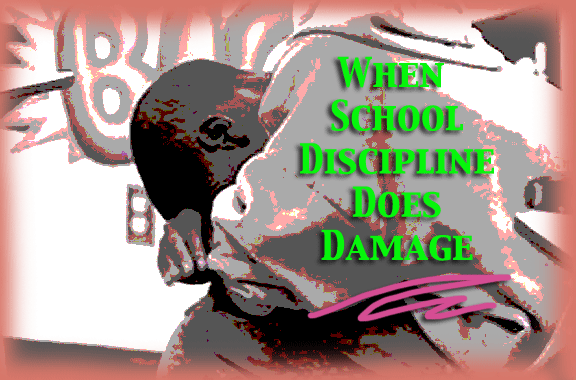
This week is the National Week of Action on the issue of school discipline. Studies have found that the chronic overuse of school suspensions, expulsions, truancy tickets, and other forms of student sanctions, does more harm than it does good. At LAUSD as well as schools across the country, a growing dependency on punishment pushes kids to drop out, and affects minority kids disproportionately, as this Talk of the Nation report indicates. (Also see WLA post on the topic.)
The LA event that is part of the week-long national effort will take place Wednesday night at the California Endowment. . It is called: Punishing our Future: School Discipline in Los Angeles. Admission is free, but it requires reservations.
In the meantime, to give you an idea of what is at stake, take a look at this essay by two very articulate young LA women, Claudia Gomez and Leslie Mendoza, edited by Annette Fuentes, author of Lockdown High.
POSITIVE SCHOOL ENVIRONMENTS, NOT METAL DETECTORS ARE THE KEY TO STUDENT SUCCESS
By Claudia Gomez and Leslie Mendoza
Graduating from high school is the dream of most L.A. students. We understand that education and a diploma can make the difference between a healthy, successful future and a dead-end job, or worse, the criminal justice system.
But just getting to and staying in school can be a daily struggle, especially for those of us coming from the poorest communities. And when we arrive at campus, we often feel unwelcome and unmotivated in a climate where police and parole officers may outnumber counselors, and teacher layoffs create overcrowded classes.
It starts on the way to school. The trip could mean walking through five or more neighborhoods, each with its own dramas, including drug and gang violence.
A monthly bus pass costs $24, a big expense for families, and when buses are full, they will pass you by. A late bus could mean arriving at school after the bell rings and getting a $250 truancy ticket from the police just for being a few minutes late. And then you have to miss more school to go to court, the only way the truancy ticket fine can be reduced.
Arriving at school, we may be greeted by a security guard or police officer, sometimes metal detectors, and gates that lock behind us when the bell rings. The police can enter classrooms, at the principal’s direction, to do random searches of our belongings, using metal detector wands. They’ve even used dogs to sniff our lockers for drugs. It’s not violence from our classmates that worries us. It’s the prison-like conditions that make us feel unsafe.
Teachers and principals use suspensions too freely, sending students out of class for behaviors they label as “willful defiance,” a catch-all term in the state Education Code that can be used as a reason to remove students without explanation for what that actually means.
If we are late to class, their attitude often is, “Why bother being here? Just go home.” They don’t realize that for many L.A. public school students, school is a safer haven than their own homes, a place to escape the problems in their families. We stay in school because we don’t want to get in trouble. If we aren’t welcomed in school, where can we go?
We are calling attention to this issue as part of the National Week of Action on school discipline, taking place Oct 1-7 in 25 cities across the U.S., including Los Angeles. It’s time to raise awareness about the overuse of truancy tickets and other forms of harsh school discipline that are on the rise in California and across the nation, and that research has shown don’t help schools become safer and more successful.
A quality education is our ticket to great possibilities, but L.A.’s schools are failing in their mission to educate. Aggressive policing in and around schools, high suspension rates and a basic lack of respect for students by staff create the conditions that have the effect of pushing out students who most need to stay in school. For too many of us, this results in being pushed into the juvenile justice system.
We call on the Los Angeles Unified School District to address the challenges students face in staying in school. Fully fund “safe passages to school” programs to make the trip to school easier and more secure. Instead of more law enforcement on campus, invest in counseling and programs like restorative justice that hold students accountable for misbehavior instead of simply kicking them out. Make sure that youth who have been in the juvenile justice system get enrolled in school once they are released, with all the support services they need to succeed.
And make the school-wide positive behavior supports policy, adopted in 2007 as an alternative to harsh and “automatic” zero-tolerance discipline, a reality.
In a school climate where students are treated with respect, and expectations are high, we will respond by respecting teachers and administrators and reaching our full potential. Help us stay in school so we can walk across the stage, diploma in hand, and into a brighter future.
Claudia Gomez, 20, and Leslie Mendoza, 16, are members of Youth Justice Coalition, a youth advocacy group that promotes reforms to LA educational policies and the juvenile justice system.
